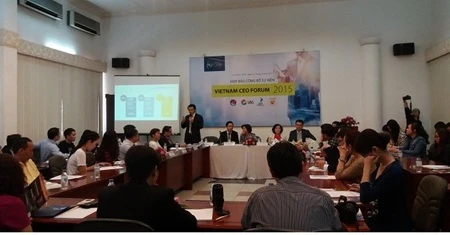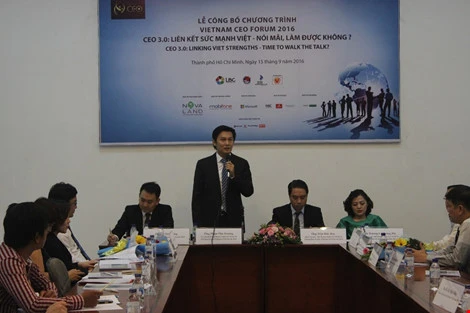Hanoi (VNA) – Business leaders in Vietnam are among the most optimistic in Asia-Pacific.
They are more likely to increase investments over the next year compared to CEOs in other Asia-Pacific Economic Cooperation (APEC) economies, according to the APEC CEO survey in Asia-Pacific in the 2016-17 period conducted by the firm PwC that focuses on audit and assurance, consulting and tax services.
Despute regional growth uncertainties, APEC CEOs continue to invest in businesses and in economies across the region to seed future growth. Among those with over-sight for markets in Vietnam, 76 percent expect to increase investments over the next year, against 53 percent of CEOs who are likely to invest across APEC.
This report reflects the perspective of 54 business leaders in Vietnam compared to all 1,154 ones (APEC CEOs) surveyed from May to July 2016.
For seven years, as Knowledge Partner to the APEC CEO Summit, PwC has conducted this survey to sharpen understanding of what’s driving business growth and investment in the region. Over half of all respondents are in organisations with more than 1 billion USD in annual revenue.
Vietnam’s central position in evolving regional trade projects further adds support to its growth prospects, according to the survey, adding that the Tran-Pacific Partnership, for one, is widely expected to boost exports, although implementation seems less certain than it did a year ago.
CEOs in Vietnam are more likely to see significant progress toward the goal of free trade in Asia Pacific compared to CEOs in the US or Japan, and consider lower-cost skilled labour a major force driving regional economic integration.
While economists expect GDP growth to moderate somewhat this year, Vietnam remains among the fastest growing in the region. The economy is drawing record foreign business investment. A market of over 90 million people, rapid middle-income growth and openness to foreign ownership combine to boost its attractiveness. The CEOs are most confident in attaining higher margins from domestic operations.
Some 33 percent of CEOs is more confident about launching a new product or service or entering a new line of business, 41 percent of CEOs believe in increasing profits margins in domestic operations, while 19 percent are less confident about increasing profits margins in international operations.
Johan Nyvene, CEO of Securities Corporation in HCM City, said Vietnam would benefit from the growing integration of regional economies. The growth rate in other countries in the region had probably reached a plateau, which will require them to invest beyond their borders.
“Thus in many cases, Vietnam is not only a destination for investors from developed countries, but also for investors from Thailand or Indonesia,” Johan said.
On average, APECT business leaders are investing in seven other APECT economies. This is the competitive arena that matters most, reflected in the rise of global foreign direct investment in 2015. Business investment capital is pushing across borders to accelerate growth and as a result, often bumping into fresh regulatory issues.
CEOs today say they balance policy and market factors in cross-border decisions. These perspectives suggest cross-border business investment will increasingly flow to the right regulatory conditions for business expansions, according to the survey.
The survey indicates that the Internet of Things (IoT) is opening up new business models and forging new and closer relationships, with customers and supply chain partners.
“Over the next three years, there will be more APEC companies deploying IoT technology than those which aren’t. The twin aims to facilitate free trade of data – and keeping that data secure – will likely persist as jurisdictions grapple with keeping laws, and regulations on cross-border data transfers in step with, or ahead of, IoT advancements and wider adoption of the technology,” the report said.-VNA
They are more likely to increase investments over the next year compared to CEOs in other Asia-Pacific Economic Cooperation (APEC) economies, according to the APEC CEO survey in Asia-Pacific in the 2016-17 period conducted by the firm PwC that focuses on audit and assurance, consulting and tax services.
Despute regional growth uncertainties, APEC CEOs continue to invest in businesses and in economies across the region to seed future growth. Among those with over-sight for markets in Vietnam, 76 percent expect to increase investments over the next year, against 53 percent of CEOs who are likely to invest across APEC.
This report reflects the perspective of 54 business leaders in Vietnam compared to all 1,154 ones (APEC CEOs) surveyed from May to July 2016.
For seven years, as Knowledge Partner to the APEC CEO Summit, PwC has conducted this survey to sharpen understanding of what’s driving business growth and investment in the region. Over half of all respondents are in organisations with more than 1 billion USD in annual revenue.
Vietnam’s central position in evolving regional trade projects further adds support to its growth prospects, according to the survey, adding that the Tran-Pacific Partnership, for one, is widely expected to boost exports, although implementation seems less certain than it did a year ago.
CEOs in Vietnam are more likely to see significant progress toward the goal of free trade in Asia Pacific compared to CEOs in the US or Japan, and consider lower-cost skilled labour a major force driving regional economic integration.
While economists expect GDP growth to moderate somewhat this year, Vietnam remains among the fastest growing in the region. The economy is drawing record foreign business investment. A market of over 90 million people, rapid middle-income growth and openness to foreign ownership combine to boost its attractiveness. The CEOs are most confident in attaining higher margins from domestic operations.
Some 33 percent of CEOs is more confident about launching a new product or service or entering a new line of business, 41 percent of CEOs believe in increasing profits margins in domestic operations, while 19 percent are less confident about increasing profits margins in international operations.
Johan Nyvene, CEO of Securities Corporation in HCM City, said Vietnam would benefit from the growing integration of regional economies. The growth rate in other countries in the region had probably reached a plateau, which will require them to invest beyond their borders.
“Thus in many cases, Vietnam is not only a destination for investors from developed countries, but also for investors from Thailand or Indonesia,” Johan said.
On average, APECT business leaders are investing in seven other APECT economies. This is the competitive arena that matters most, reflected in the rise of global foreign direct investment in 2015. Business investment capital is pushing across borders to accelerate growth and as a result, often bumping into fresh regulatory issues.
CEOs today say they balance policy and market factors in cross-border decisions. These perspectives suggest cross-border business investment will increasingly flow to the right regulatory conditions for business expansions, according to the survey.
The survey indicates that the Internet of Things (IoT) is opening up new business models and forging new and closer relationships, with customers and supply chain partners.
“Over the next three years, there will be more APEC companies deploying IoT technology than those which aren’t. The twin aims to facilitate free trade of data – and keeping that data secure – will likely persist as jurisdictions grapple with keeping laws, and regulations on cross-border data transfers in step with, or ahead of, IoT advancements and wider adoption of the technology,” the report said.-VNA
VNA
























